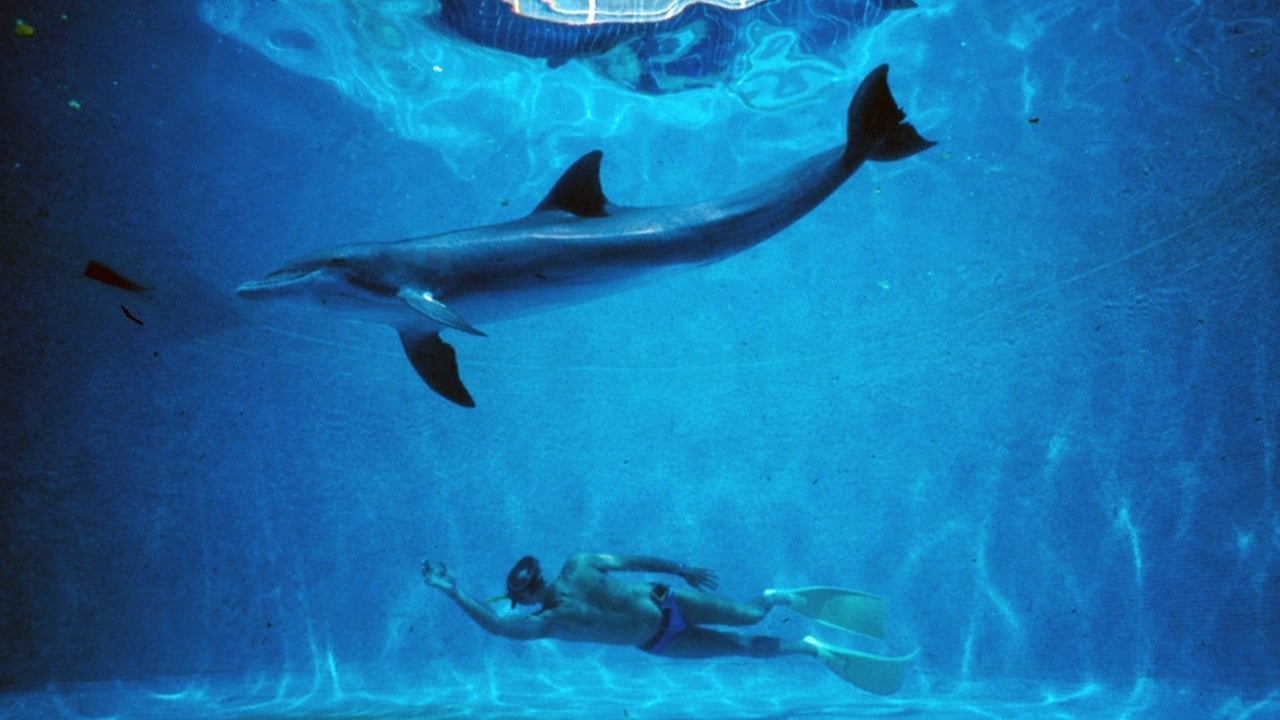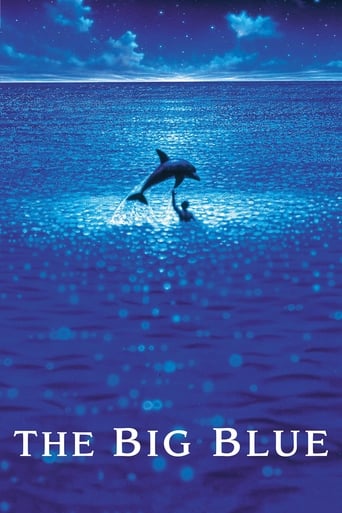Red-Barracuda
Two childhood friends who are free divers, one of whom has the almost supernatural ability to adjust his heart rate so that his vital signs are closer to a dolphins than a human, meet up after many years and take part in a contest to see who can dive the deepest without scuba gear. Love and friendship vie with the competitive spirit and the allure of the ocean to complicate matters.The Big Blue is another product of the 80's French film movement, the cinéma du look. These films were typified by their adherence to cinematic style over dramatic substance. Director Luc Besson was one of the leading film-makers in this category and The Big Blue is perhaps his most personal film. It is slightly unusual for a Besson movie in that it isn't action-oriented in the traditional sense. The sport angle does of course have an element of drama but it's never really the focus at all and there isn't truthfully much tension in these scenes really. The story essentially focuses on a man who makes a choice between the friendship of a peer, the love of a woman or the elemental draw of the sea. The latter choice wins out quite clearly with the central character having an almost spiritual infinity with the ocean. Some of the underwater sequences here are beautifully presented and the cinematography in general is nice. It's a good looking film, yet despite being about deep water divers it does have a certain lack of depth dramatically. This isn't necessarily an issue for me but it does mean that it's two-an-a-half hour runtime does seem definitely excessive. This is not a story that required the epic treatment to be honest. Acting performances are generally good enough to engage though. Rosanna Arquette appears in a fairly under-written role but I thought she was still quite adorable and only went to serve further the oddness of the central character's decision in rejecting her for a life with the dolphins. On this note, we have an interesting and somewhat depressing ending which veers into dream-like fantasy territory - it's a bit of a downer of a denouncement, yet it is true to the material so I shouldn't complain too much over this. Ultimately, this is definitely an uneven and overlong movie but, like most of the others in the cinéma du look sub-genre, it improves with a re-watch and is certainly somewhat distinctive.
TheLittleSongbird
When one sees that a film is directed by Luc Besson, has music by Eric Serra and that it has Jean Reno, it is hard not to expect a lot. 'The Big Blue' meets the high expectations, if just falling short of exceeding them, while it is a very divisive film and it's not one of my favourites it is a beautiful film and really quite stunning at its best.'The Big Blue' does fare better in the friendship than the love story. The love story has some sweet and touching moments but it is on the shallow and sketchy side. This would have been made better if more thought was put into Rosanna Arquette's character, if she was made more endearing and that she was better developed. Instead the character felt almost like an afterthought at first and Arquette didn't do much for me sadly.Regarding 'The Big Blue's' story, it generally, while full of enough things to make the film worth sticking with, is a bit thin for such a long length.However, the friendship has a lot of charm and warmth, with sprinkles of humour and nostalgia. Besson's direction often is masterly, with an amazing eye for style and visual beauty and he really does bring out the best of his actors. Excluding Arquette, which was largely actually because of the way the character was written (people may be tired of hearing this as an excuse when actors/actresses give not so good performances when working with not so well written characters but actually to me it is a valid one), the acting is very good. The obvious standout is a superb and often very funny Jean Reno, but handsome Jean-Marc Barr also shows why he was deserving of a bigger career.Eric Serra's music score is a big asset, soothing, understated and hauntingly hypnotic. There is a good deal of charm, also humour and poignancy in the writing.Best of all when it comes to 'The Big Blue' is the cinematography and the underwater scenes. The scenery is also exquisite. There are many visually beautiful films out there, beautiful doesn't do the sensational cinematography justice. Haven't seen a film with cinematography this good in a while and while Besson's films are all very well made 'The Big Blue' is a very strong contender for his best-looking film. The film to me contains the finest underwater sequences in film, poetic and tear-jerking and the ocean has rarely looked so magnificent and it was clear the camera was in love with it. One moment particularly stands out, the first plunge into the mysterious blackness is simply cinema at its most magical.In summary, while it didn't quite blow me away 'The Big Blue' is an incredibly well done film. 8/10 Bethany Cox
ElMaruecan82
In 1956, Louis Malle's documentary "The World of Silence" made an extraordinary sensation. Captain Cousteau showed to the world the unsuspected wonders underneath the blue surface we laconically call 'ocean' or 'sea'. Oceans, like the divine soup where the recipe of life was concocted, revealed the womb of Mother Nature: a fauna and flora that had nothing to envy on the world above the ground, and was for the first time caught by the camera's eye. The film won the Golden Palm and the Oscar for Best Documentary but the world had to wait for three decades so another French director would write a similar love to the greatest part of our world, in every sense of the world.From the very title, you know that Luc Besson deeply loved the ocean, this is no marketing titling, "The Big Blue" is his 'world of silence', as unlimited as its invitation for dreams and contemplation, one that could evoke Simon and Garfunkel's melody, starting with "Hello, Blueness my old friend…", blueness as the color of the sky, dreams, life, purity, simply said, the most relaxing and eye-comforting color. Luc Besson is comfortably tucking us up and take us in a universe whose mystical nature is magnificently conveyed by Eric Serra's score. This is one of the most instantly recognizable French scores of history, and in pop-culture, has become synonym of a long and slow descent. The recurring theme sounds like some whale sounds, one that seems ominous, another more reassuring, disturbing yet weirdly absorbing. You don't get in the water, you become part of it.Indeed, contrarily to "The World of Silence", men don't use respiratory devices or wear equipment, and those who do, meet a fate that seems like punishment for 'cheaters'. You don't cheat the ocean, it is like wilderness you try to tame, and you don't do it without being part of the wilderness yourself, the film isn't about typical divers, these are apneists. Loosely based on the sporting rivalry between two legends Jacques Maiol and Enzo Molinari, the film centers not just on their relationship but also their relationship with the sea and the rest of the world. And what makes the story so appealing is the triangle of characters made of Jean-Marc Barr, Jean Reno and Rosanna Arquette, each one incarnates one side of this triangle of feelings and misunderstandings.Jacques sees the sea as his world, his respiratory performances are exploited for the purpose of science but it's only with the dolphins that his humanity resurfaces. And Jean-Marc Barr plays him like an eternal mystery drown under the blueness of his eyes, an alien who can only feel if this feeling has any connection with the sea. Johana, the American who falls in love with him, represents the world, she's lovely, smiling, funny, loving but so desperately banal from Jacques' standpoint, yet they fall in love, and it's very fitting that the moment that 'breaks the ice' is set in the water. Finally, Enzo is the character who sticks in our mind, the bridge between the two worlds. He understands both Johana and Jacques, and his flamboyant and charismatic personality can only come from a man who has one foot in the water and one in the real world, the one that can admire him.Enzo is all hubris, he's the one who brings Jacques to the competition in Sicily, to set a record that's been pending ever since their childhood in Greece. Enzo is not the most competitive of the two, he's the only one, Jacques concedes "you're the best", to which Enzo replies "we'll see". Enzo is a man of honor and can only taste his victory is it's real, his pride is his biggest weakness, so his sad fate doesn't come as a surprise. Because if there are three characters in the film, there is a fourth one too, and I'm not talking of the Dolphins. The ocean or water is omnipresent in the film but not just as a setting but a protagonist too, as if Besson cared less for what happened in the ocean than the aftermath.When drunken Jacques and Enzo fool around inside a pool, their hangover is one of a kind, when both treat water with respect and dedication, they are victorious, when Enzo pushes his luck too far, he only realizes he's a man when it's too late. The wit's soul is to know one's place, and the essence of the film is that indecisiveness in Jacques, to which world he belongs… or maybe he made up his mind already, and that's his misfortune or Johana's tragedy, she who has Jacques' baby playing apnea in her belly, doesn't look at the Ocean as a mistress, but as the one that made Jacques such a wild animal she foolishly wanted to tame, but couldn't because she wasn't part of the wilderness. The ending is sad, but in such a poetical way it feels like the only satisfying one. Besson couldn't paint the ocean is such a cinematic majesty and not let the most humble of his character surrender to it."The Big Blue" was the most successful movie of 1988, it became an instant classic thanks to its beautiful cinematography, its iconic score and the scene-stealing performance of 40-year old Jean Reno. Luc Besson wasn't a late bloomer and became the French 'it' director, the one who invented a style that could speak to the audience, mostly the youth (we even saw the film and studied it in 4th Grade). Sometimes, he seems to be much aware of his directing talent and overdoes it a little, too hip and stylish for its own good, even Reno's acting leans toward the comedic, and some unrealistic situations belong to another film as if Besson was also playing with camera like Enzo with water, when you look at the magnificent spectacle the camera achieves, you're ready to forgive all these little flaws..

